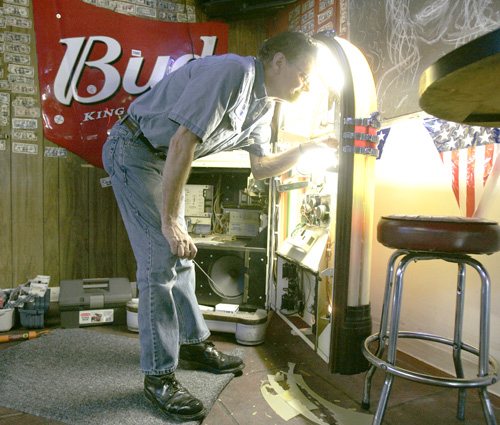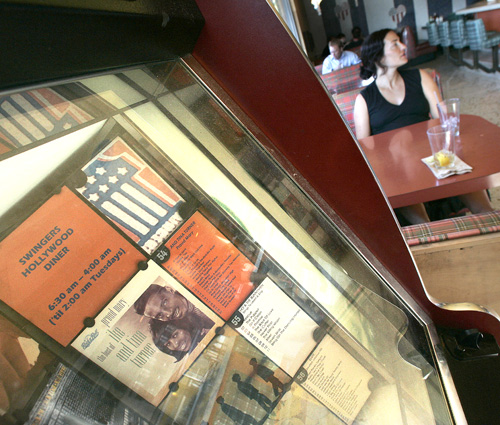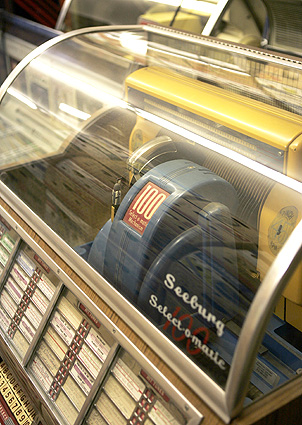Keeping
the jukes jumping
They
are to the music industry what unicorns are to
reality:
magical, mythical beasts. But spinning those tunes
on vinyl,
they’re the life of the party.
By Dean Kuipers, Special to The Times
August 10, 2006
 |
| At
your service |
 |
| Vinyl
fetish |
 |
| Petty
cache |
|
Don
MULLER stands in his living room, grinning like a
caffeinated teenager, clearly dazzled by the magic he
has wrought. The playroom in his Van Nuys ranch
home features four classic jukeboxes crowded around a
small dance floor, and lightbulbs are flashing like an
arcade around the room and across the ceiling.
"See
how this model has a speaker on top?" he shouts,
patting a 1946 AMI "mother-of-plastic" Model A
jukebox, as Eddie Cochran's "Summertime Blues"
comes blasting out at about ear-level. "That
was so it would play over the top of the tables.
See, this would be the music for a whole restaurant or
dance hall, and it only took one machine in the corner
to do it. It really kicks it out!"
Muller
is clearly enjoying himself, and his enthusiasm is
infectious. To thousands of Southern Californians
who own jukeboxes that play vinyl records, and the
smattering of restaurants and bars that still keep them
around, he is something of a guru, a figure familiar to
the rich and famous, to music junkies and nostalgia
freaks. Now in his 35th year as sole proprietor of
Jukeboxes Unlimited, Muller has seen the industry turn
toward CD jukes and, recently, to Internet-connected
players that download songs from massive
databases. He is one of only two guys in L.A. who
still make house calls to service record-playing
jukeboxes. He's a gadget freak and is the first
one to admit it.
But
it would be a mistake to think that the jukebox fetish
is all about these lights and bubbles and fake
mother-of-pearl.
"Oh,
no," he says, his face getting serious. He stops
what he's doing, which is punching up song after
song. "I need to show you something."
We
move swiftly through the back door. Behind his
house is another building, a garage the size of a small
barn. He swings the door open and says, "This
is a lifetime's worth of music."
It's
more than that. It's several dozen lifetimes' worth.
It's the most staggering collection of vinyl imaginable.
In that garage, loosely arranged on floor-to-ceiling
shelves, in banana boxes, in crates, in retail record
bins, are more than 400,000 vinyl singles in 45-rpm and
78-rpm sizes. Plus 5,000 to 7,000 albums and EPs, and
then some reel-to-reel tapes and even 8- and 4-track
cartridges. This is the real driving force behind
his passion for the jukebox; what matters to Muller, 63,
is the music.
Jukeboxes,
to Muller, are about entertaining. The machines
are at their best when they're surrounded by partygoers,
selecting songs they can't wait to hear.
"I
have always been the party guy," a grinning Muller
says, adding that his first business, in the 1960s, was
called Parties Unlimited. He'd bring the music,
the sound gear, the sorority girls, even provide the
rented house.
"But
then one day I rented a jukebox for a party.
People loved it. It was the best party we ever
had!" he nearly shouts. "I got an idea.
I started buying up every jukebox I could get my hands
on. "The outrageous success of the iPod and,
before that, illegal file-sharing sites such as Napster
are only the latest way to scratch what is now a
129-year-old itch: to program your own music, on your
own machine, and make your own party. That desire
began with the invention of Thomas Edison's
"Phonograph or Speaking Machine" in 1877, but
it didn't become a staple of public life until Edison's
machine became the jukebox. And that happened,
fittingly, in a bar.
According
to recorded-music lore, the official birth date of the
jukebox is Nov. 23, 1889, when Louis Glass and William
Arnold demonstrated an Edison Class M Electric
Phonograph, which played prerecorded cylinders, fitted
with a coin mechanism known as a
"nickel-in-the-slot," in the saloon of the
Palais Royale restaurant in San Francisco. It was
a smash success, and they patented the coin
apparatus. By May 1890, the two men said, the 15
machines they had built had raked in $4,000, a huge sum
for the times. A booming business was born.
The
flat-record disc as we know it already existed at that
time, having been patented by Emile Berliner in 1888,
but disc and cylinder players were both too expensive
for the average home, so the coin-operated players
exploded in popularity. For the next 25 years or
so, this was the record industry. Near the turn of
the century, the spring-driven machines began replacing
live bands in the "juke joints" that
proliferated near the cotton fields of the South, and
thus the name was born: the jukebox. By the 1930's, the
big-name manufacturers we know today began developing
their effusive, bulbous wonder gizmos that dazzle the
eye as well as the ear — the Rudolph Wurlitzer Co.,
the Rockola Manufacturing Co., AMI Inc. and the J.P.
Seeburg Co.
In
1947, Seeburg came out with a durable mechanism that
could manage 50 vinyl records, playing both sides of
what were then big 78-rpm discs, thus offering 100
selections. The modern jukebox era was born, and
competition among operators was stiff.
"Years
ago, you really had to be on your toes about it, because
you would lose a location, easy," says Tom
Blackwell, a jukebox operator in South Carolina who
began one of his businesses when he was a teenager,
around 1945. "You had to keep the machines
running real good, because there was too many people in
the business. On jukeboxes, the main thing was changing
records — keeping the new top records in there."
Blackwell
kept up by reading Billboard. Most people think the
record companies supplied the records, he says,
"but that never happened." Instead, he
raced kids to the record shops when new hits would land,
trying to keep about 1,000 machines stocked with the
latest releases.
And
every once in a while, he'd sell a jukebox to someone
who wanted to put it in his home. "They'd get
'em at Christmastime," he says, laughing, "but
then they'd never play 'em unless they had company come
over."
Which,
for Don Muller, is the point: The jukebox comes to
life when you have company.
In
the late '60s, Muller discovered a cache of 40 vintage
jukes in a theater in Prescott, Ariz., and bought the
whole lot for about $3 apiece. He fixed them and
began selling them to private individuals, to strip
clubs (the girls could program their own songs) and to
developers who'd put them in their model homes.
He
began doing TV ads. Quickly, he had a big shop in
Phoenix and was buying and selling jukeboxes all over
the country.
In
the early '70's, he moved the operation to L.A. It's not
out of line to say that the reason so many American
homes have jukes in them today is because of Muller; his
was the first business set up to put them into homes.
"My
kids didn't go somewhere else to party," says
Muller, who has sold more than 15,000 jukeboxes.
"They
were here, and all their friends were here, and their
parents knew they were here. Now I go to their
weddings, and they sit there and say, "The best
time of my life was growing up at your house."
"I've had everyone up here from Martin Scorsese to
Barbra Streisand, and everybody just loves the
jukebox," says legendary music producer Richard
Perry, seated in the rec room of his home above the
Sunset Strip. The Art Deco room has a bar and
walls full of instruments and gold and platinum records.
Like Muller, who sold him his 1978-79 Seeburg Disco
jukebox, his primary interest is in the music.
"I
was particularly fortunate to find this gem," he
says, beaming. "It sort of has an Art Deco
look, like it belongs here. This was the only
sound source they used in the disco; they'd just crank
it up. This is probably the most powerful jukebox
I've ever heard. The room gets pumping when that
thing is cranked."
As
a demonstration, he turns up "Love TKO"; at 50
watts per channel, it's flapping the potted
plants. Plus, he affirms, the jukebox experience
is hands-on fun. And everybody, himself included, loves
to choose music.
"I
dare you to name one person who doesn't find it fun to
stand around the jukebox and be part of programming
whatever music they want to hear," he says.
For
Perry, who has produced albums for artists from
Streisand to Ringo Starr to Carly Simon to the Pointer
Sisters, and continues today to have huge hits with
albums of standards by Rod Stewart, stocking the jukebox
is an art unto itself. His has 80 selections, and
his standards are high. He picks a song like Van
Morrison's "Moondance," for instance.
"Come on; that's a song that's great to hear
anytime, anywhere. I strive to have every song as
meaningful as that," he says.
So
his machine is packed with '40s big-band classics such
as Glenn Miller's "Moonlight Serenade," a
smattering of doo-wop and lots of R&B, Sinatra and
classic blues. There are about 60 selections, he
says, that he'll never change. The other 20 slots,
however, are for contemporary stuff, experiments. And
don't try to tell him that a CD jukebox would give him
more selections.
"The
CD jukeboxes have hundreds and thousands of selections,
and it leaves too much to someone else's potential bad
taste," he says with a smile.
For
others, taste may have other connotations.
Children of the alternative '80s and '90s find a jukebox
can be an ideal display site for that offbeat record,
keeping what might be a little-played record at your
fingertips.
"When
I was a kid and started to collect 45's, you had the
little spindle where you could stack about five of them
on your record player," L.A. music journalist Dan
Epstein recalls, "and I just like remember going to
restaurants where they had a jukebox and going, 'Oh,
that would be so badass. I could put all my 45s in this
thing and not have to take 'em in and out of their
sleeves, just play 'em.'"
By
the time he got his 1964 Wurlitzer about eight years
ago, he had 3,000 to 4,000 singles. Then his
obsession exploded.
"Oh,
God, yes! I probably bought like another 1,000 or 2,000
in the next five years. From digging through
25-cent bins at used-record stores to going on eBay and
tracking down MC5 and New York Dolls singles."
And
the more obscure, the better. Epstein would change out
the records every few months, adding rarities like
"Naturally Stoned" by the Avant-Garde —
game-show host Chuck Woolery's '60s psychedelic band —
and "Break It All" by Los Shakers, Uruguay's
version of the Beatles.
Though
several people interviewed for this story admit,
somewhat sheepishly, that their jukes have suffered
because of their new devotion to the iPod, filmmaker and
former Rhino Records artistic director Sam Epstein (no
relation to Dan) claims nothing can usurp his 1958
Seeburg with 200 selections. He's a die-hard
collector of 45s, now owning more than 10,000, and
contends the ideal sonic and aesthetic environment for
discovering music is the jukebox.
"The
45 is the way it was originally intended, you know? For
a lot of early rock 'n' roll, a lot of vintage
vocalists, even the punk movement," Sam Epstein
says. "It's more organic than any of the
digital media, especially if you get an old Motown 45,
or an old Chess 45, and you hear Howlin' Wolf or Bo
Diddley. It's kind of like the whole box rumbles
and the room rumbles, and it's different each time you
play it."
Having
been at Rhino more than 25 years, Sam Epstein also loves
how what he calls "feeding the jukebox" leads
him to new music. His interests have led him to
make a film about the blues, still in production, called
"When Blue Men Sang the Whites." He'll ask
friends going home to Nigeria to bring him fresh juju
singles, or will set up his whole jukebox with
Bakersfield country.
"For
those who really like to play the records, this was the
machine," Epstein says of the Seeburg.
Tom
Blackwell points out this is an urge the downloadable or
Internet jukebox may not scratch sufficiently. He
notes that all commercial jukeboxes have about 20 songs
on them that are the hot sellers, the hits, and it's
always been that way. The Internet jukes offer so
many songs, and such little editing, that they're
actually not as fun. So far, he understands,
they're also not making much money.
Sam
Epstein points out that this is exactly why the home
jukebox is now so important. It's about selecting music,
programming it. The box keeps the 45 alive, and
45's keep whole genres of music alive.
"Pop
music is always going to be about what sells," he
says. "And the whole fun of my jukebox is
discovering things that were an obscurity — one of
mine was Sugar Pie DeSanto. She was a singer, a
pal of Etta James, still lives up in San Francisco,
putting out records. You'll never find that stuff
downloadable, or whatever. It just doesn't make
marketable sense. It's kind of like the haphazard
route of history."
|
|